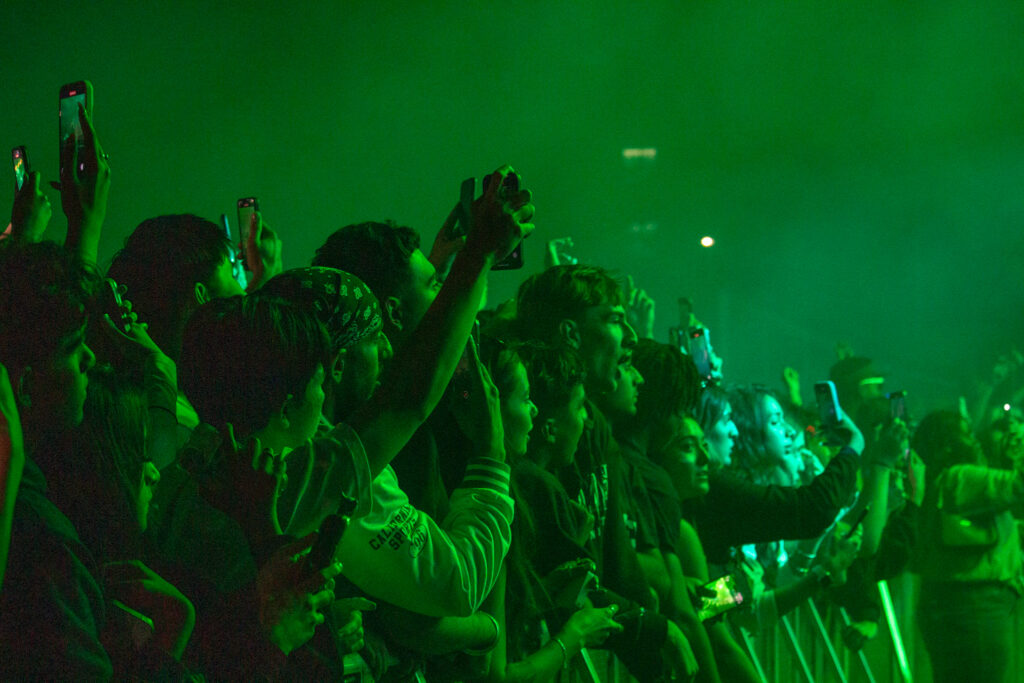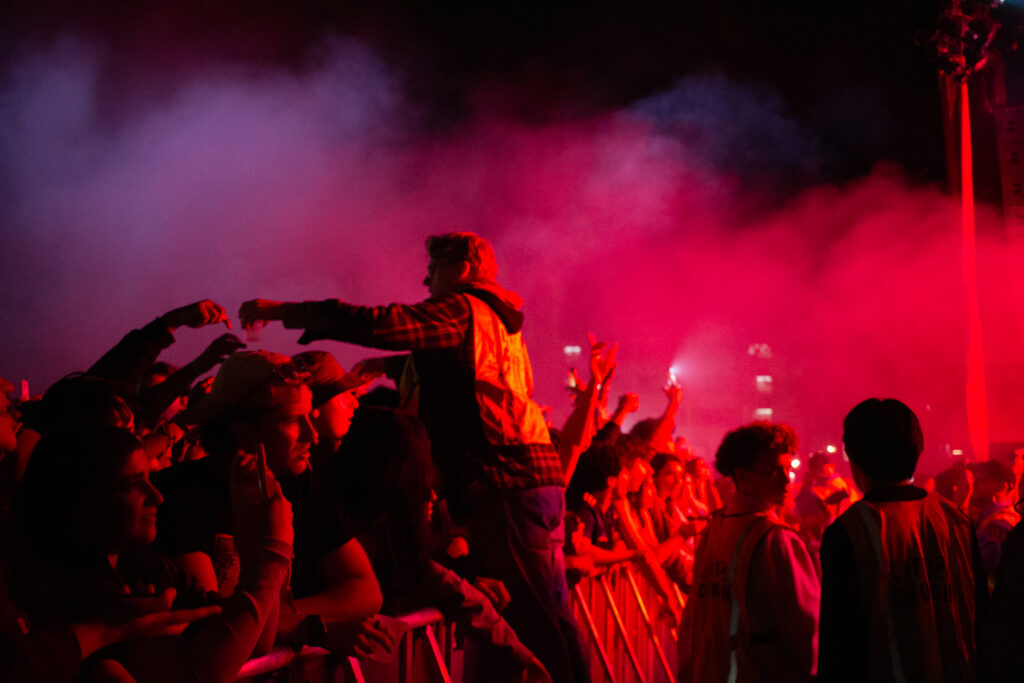Zero Waste McMaster cleans up neighbourhoods surrounding campus following homecoming parties
On Oct. 7, members of McMaster's Zero Waste club gathered on campus to collect waste and clean up the Westdale and Ainslie Wood neighbourhoods following the events of homecoming on Oct. 5. The student-led club is committed to promoting a low-waste lifestyle to students and community members both on and off campus while raising awareness about pressing environmental issues.
Jessica Prevost, co-president of the Zero Waste Club, spoke about the motivation behind the cleanup and the event’s turnout.
“Zero Waste tries to do a cleanup every semester and we usually try to do the fall one around homecoming because with the street parties, it can get pretty gross on the street … so we wanted to help clean that up as quickly as possible … the goal was to help clean up the [surrounding] neighbourhoods, especially for the people who live there who are not responsible for the garbage,” said Prevost.
The goal was to help clean up the [surrounding] neighbourhoods, especially for the people who live there who are not responsible for the garbage.
Jessica Prevost, Co-President
Zero Waste McMaster
Despite fewer attendees participating in the cleanup than expected, the club managed to collect three bags of garbage and two bags of recycling.
Prevost noted that all supplies, including garbage and recycling bags and gloves for the cleanup, were provided through the City of Hamilton's 'Team Up to Clean Up' community program. "You can sign up a group of people or friends for a cleanup initiative and they provide all the materials for free … If you dispose of [the garbage and recycling bags] at your house, they do not add to the total garbage or recycling bag count, which is super convenient,” said Prevost.
The Zero Waste club also plans sustainability-focused workshops and campaigns, advocating for students, faculty and community members to adopt less wasteful, low-impact lifestyles. Zero Waste has made a map showing the locations of all compost bins across campus.
Zero Waste is also collaborating with small sustainable businesses to create a discount program for McMaster students, offering a range of sustainable and eco-friendly products at an affordable price. Local businesses such as "That Planted Fork", "Audstruck Expression" and "The Casual Gourmet" are participating in the program, where students receive a discount code that can be applied at checkout.
Prevost noted that one of the club’s key goals is to emphasize that reducing waste should not be overwhelming and that every student’s impact can be significant. “Zero waste [living] is not as hard as it sounds … it is not about [achieving] zero waste, just reducing waste … it can be as simple as composting, as long as you have the resources, or turning the lights off when you don’t need them … there are many little things that you can do that really matter,” said Prevost.
Zero waste [living] is not as hard as it sounds…it is not about [achieving] zero waste, just reducing waste…it can be as simple as composting, as long as you have the resources, or turning the lights off when you don’t need them…there are many little things that you can do that really matter.
Jessica Prevost, Co-President
Zero Waste McMaster
The next
You can visit the Zero Waste Club's website and Instagram for more details and to sign up for their events.
This article is a part of the Silhouette Photo-Journalism series.
Before the concert starts, we wait in anticipation for the concert to begin. Phones line the view as DJ Migz walks on.

Migz ends his performance with the crowd’s heartbeat synced to his turntable, every beat landing with the feet of the crowd. He tells the crowd to wave their phones as he walks out.

Lil Tecca ignites the crowd as soon as he walks on stage. He gives everything he has into the performance, bringing the crowd to a heightened level of excitement.

Students reach into the stage. Lil Tecca’s energy seeps through the crowd. I feel people pushing to the front.

Students line the barricade to get a better view. BSB field is packed.

Lil Tecca ends his performance with his 2019 viral hit Ransom and the crowd sings it for him. Every word sung by the crowd deafens the speakers.

Students push to the front as Lil Tecca performs Ransom. He asks the crows to move back as students begin to fall.

Lift Church hands out water to the crowd. Much needed in the heat of the concert. Relief is felt in the breath of the Mac as people move back and hydrate.

Loud Luxury amazes when people thought they were finished. Pyrotechnics reignited the crowd when people though they were done.

The light show ensued. Loud Luxury united the crowd in one last song. Everyone is singing. The McMaster community feels united.

The FCC provides access to a community kitchen, food bank and now a fridge offering non-perishable items after relocating to the Hub
Following the closure of the McMaster community fridge, the Food Collective Centre has resumed in-person operations after relocating from the basement of Bridges Cafe to the Hub.
As of Oct. 1, students can visit the FCC food bank, located on the third floor of The Hub, to access both non-perishable and perishable food items as well as hygiene products, free of charge. The food bank is open Monday to Friday from 10:30 a.m. to 2:30 p.m.
The FCC is a student-run food bank and resource of the MSU. It aims to combat and alleviate rising food insecurity among students. The FCC also aims to raise awareness about the stigma surrounding food insecurity.
Ella Ying, the FCC director, spoke about the transition of the FCC from Bridges Cafe to The Hub. “It is very important for us to just share that these resources do exist within the McMaster community … when we were back in Bridges, not a lot of people knew … it was not quite as accessible as the Hub,” said Ying.
It is very important for us to just share that these resources do exist within the McMaster community … when we were back in Bridges, not a lot of people knew … it was not quite as accessible as the Hub.
Ella Ying, Director
Food Collective Centre
With the move to the Hub, the FCC is also repurposing the community fridge and freezer to store perishable items. Ying noted that while the fridge will function similarly as it did under the former student-run community fridge initiative before it closed, it will now be supervised by the FCC during operating hours.
Ying mentioned that the FCC has also introduced an anonymous tracking system to monitor which items are most popular, with volunteers keeping records of who uses their services while maintaining individual confidentiality. “We are able to ask whether undergraduate or graduate students are using our services more … and even though we have only been open for a week and a half, in the first week, which was only four days of operations, we actually saved students $520 in groceries and we had around 40 people using it on the first week,” said Ying.
Ying noted that this is a significant increase in usage since moving from the basement of the Bridges Cafe, where fewer than 10 students accessed the food bank weekly.
Ying also noted that food insecurity can take many different forms and does not necessarily mean an immediate need for food. It can also include challenges to accessing affordable organic foods and local produce. “FCC [aims] to target [all aspects of] student life, especially hoping to alleviate food insecurity in every form,” said Ying.
“A lot of people are worried about, what if I am seen using a food bank or do I deserve to even use a food bank? But we really want to emphasize this year that everyone deserves to use it. If you need to use it, please come to us … this is exactly what we are here for and we have so many different resources that people are still discovering,” said Ying.
We really want to emphasize this year that everyone deserves to use it. If you need to use it, please come to us … this is exactly what we are here for and we have so many different resources that people are still discovering.
Ella Ying, director
Food Collective Centre
Ying mentioned that the FCC is collaborating with the community garden, where volunteers have been packaging fresh, local produce for students. “I am very excited for people to [have access to this produce] from them and especially since it is fresh, it can prolong the life of the produce as well … I think it is a win for both sides,” said Ying.
In addition to the food bank and fridge, the FCC provides several support services to the McMaster community. Among these are free monthly cooking workshops open to students, faculty and the broader Hamilton community along with a community kitchen cookbook. Hosted on campus, these workshops offer an accessible space for learning to cook, with all ingredients provided.
The FCC’s Good Food Box initiative is another service that delivers affordable, fresh produce to the McMaster community on a monthly basis at a discounted price.
For those seeking discreet assistance, the FCC offers the Lockers of Love initiative. This allows students and community members to order non-perishable food items online using an unique code, which they can then pick up from a locker on the first floor of The Hub within five days.
Throughout the year, the FCC also hosts additional monthly events to raise awareness about food insecurity.
Ying mentioned that among the initiatives planned for this year, the FCC hopes to host a food security conference and collaborate on activities with different cultural groups on campus. They also plan to organize a “Trick-or-Eat” event where they will go door-to-door asking for food donations from students and the nearby Hamilton community.
For more information on the various FCC initiatives and how to access them, visit their website and social media.
Amidst the hype of HOCO, resisting the pressure of FOMO may be the most valuable experience of all
By: Ardena Bašić
Opinion Contributor
Homecoming, often referred to as HOCO, is one of the most hyped-up events of the university back-to-school season. While intended to kick-off the football season, many students use it as an opportunity to become more ingrained into the campus community, bolster school culture and have fun before the busy year ahead.
Yet, amidst the excitement and celebration, many students can feel an immense amount of pressure to participate in this and other events lest they be subject to FOMO.
At McMaster, HOCO celebrations transform the campus and surrounding area into a sea of maroon and grey, with parades and parties bringing students together to kick off the school year.
While controversies and concerns about HOCO have come up in recent years, the overall aim is to bolster student culture as opposed to instigating trouble. This year in particular, McMaster focused on bringing back the fun to campus, planning attractions including concerts, foam parties and of course the football game. MSU President Jovan Popovic explained that the aims of the planned activities were to make HOCO a mainstream event and keep students on campus and away from neighbourhood streets.
With these highly anticipated events also comes FOMO, the fear of missing out, which can be impactful on multiple areas of university life. Specifically for HOCO, social media posts, on-campus conversations and the general atmosphere of the weekend can make the pressure to participate overwhelming. With over 75% of students experiencing FOMO in general, it's no wonder it can lure students into these events that they otherwise might not be interested in.
This pressure can have negative impacts on students' well-being.
For example, those who feel compelled to attend events that don't align with their interests or comfort levels may experience anxiety, stress, or a sense of inauthenticity. In addition, the overall experience of FOMO can lead to decreases in overall motivation, significant anxiety and other health issues and poor behaviours.
All things considered, its crucial for students to learn and remember that the university experience is a unique, non-standard one that should be tailored to each individual. While HOCO may be a highlight for some, it's perfectly valid to opt out or find alternative ways to celebrate that better align with your values and interests.
For the future homecomings, students should take time to reflect on their personal values and priorities and whether it will actually constitute a fun and fulfilling time for them. In addition, the confidence to communicate these decisions without pressure to conform to others is vital in staying true to one's self unique and personal values.
Learning to resist the FOMO pressure is valuable beyond just HOCO. By making conscious choices about how best to spend your time and energy, you develop self-awareness and confidence that will serve you well throughout your academic career and beyond.
In fact, research clearly shows that the more work one does on developing these attributes during young adulthood, the higher their self-esteem. In turn, this will support the rest of one's university life and beyond.
While this year's and future HOCOs will undoubtedly create memories for many, it's essential to remember that your university experience is yours to shape. Whether you choose to participate in HOCO festivities or your own alternative activities, what matters most is that your choices reflect your authentic self.
By staying true to your values and interests, you'll not only navigate both HOCO and other events with greater ease but also cultivate personal growth that will last long after your degree is earned.
Loneliness in residence is the quiet reality for many students, but with just a little effort we can turn residence into a warm community
By: Dawn McKee, Opinion Contributor
Moving into residence at McMaster is like stepping into a whole new world. After years of high school where we had our routines, our circles and our comfort zones, the jump to university is a huge change. A lot of us come in expecting a busy social life, imagining new friends and endless hangouts.
But for many, it doesn’t always work out that way. In fact, residence could often feel more isolating than you’d expect.
From what I’ve seen, the social scene in residence isn’t as open as it seems. People tend to stick with their dormmates, or if they’re lucky with friends from high school. While that may work for them, it can leave others, especially those without pre-existing friendships, feeling left out.
From what I’ve seen, the social scene in residence isn’t as open as it seems. People tend to stick with their dormmates, or if they’re lucky with friends from high school.
Breaking into established groups tends to be hard. You might find yourself surrounded by people, yet still feel like an outsider. It’s one of those ironies where you’re in a place packed with students, yet the loneliness hits harder than ever.
And it’s not just a McMaster thing. University life in general has this invisible pressure to find your people right away.
There’s this underlying expectation that your college friends are supposed to be the ones who stick with you for life and if you haven’t found them yet, you’re somehow behind. But the truth is, friendships take time.
Not everyone clicks right away, and that’s completely normal. Yet, when you’re in that space of trying to find your place, it’s easy to feel like you’re the only one going through it. It seems like everyone around you has figured it out. They’ve got their group and their rhythm while you’re still struggling to break into the flow.
In reality, a lot of students feel the same way — they just don’t talk about it.
It’s like there’s a stigma around admitting that you’re lonely or having a tough time connecting. But if we could all be a little more open about the fact that university and residence life might not be what you expected, it would probably help a lot of people feel less isolated. The truth is no one really talks about the moments when you sit in your room wondering why the social scene isn’t coming together like you imagined.
It’s like there’s a stigma around admitting that you’re lonely or having a tough time connecting. But if we could all be a little more open about the fact that university and residence life might not be what you expected, it would probably help a lot of people feel less isolated.
So, what’s the fix?
I think universities in general can do more to help students connect in meaningful ways, not just through big events or loud parties. While those things are fun for some, they don’t always work for everyone.
What about smaller, low-pressure gatherings where you can get to know people? Events that go beyond your dorm floor or existing friend groups. Activities like casual game nights, crafting, or even coffee meet-ups — things where you would show up, be yourself, and talk to people without feeling forced or awkward.
At the same time, we as students can do more too. It’s easy to stick with what’s comfortable, to hang out with the same group every day, but it doesn’t hurt to be a little more open to new people. If you see someone who looks like they would want a friend, why not reach out? A simple “hey, want to join us?” can make a bigger difference than you think. Small gestures like that help break the barrier for someone who’s feeling on the outside.
At the same time, we as students can do more too. It’s easy to stick with what’s comfortable, to hang out with the same group every day, but it doesn’t hurt to be a little more open to new people.
The loneliness in residence is real, but it doesn’t have to be a permanent part of the experience. If we all would make just a little more effort to be inclusive, to step outside of our own comfort zones, residence life would be a lot more welcoming for everyone.
We might not fix everything overnight, but even small changes in how we approach friendships and socializing could start to make things better. At the end of the day, we’re all just trying to find our place. It’s a lot easier when we’re helping each other out along the way.
Amid Canada's housing crisis, the cap on international students will fail to address it and only comes at the cost of their education and futures
News flash: Canada is suffering from a housing crisis! What a surprise.
The lack of housing, and affordable housing at that, has been a chronic issue affecting off-campus students. In recent years, renting costs have dramatically increased..
Partly in response to the lack of affordable housing, the Canadian government implemented a two-year cap on the number of international students to be admitted into the country. They also implemented rules limiting these students from receiving work permits and buying homes in Canada.
Partly in response to the lack of affordable housing, the Canadian government implemented a two-year cap on the number of international students to be admitted into the country
According to Prime Minister Justin Trudeau, the temporary cap would help to regulate the number of students in the country and reduce demand on the housing market.
Specifically, it limits the enrollment of international students to approximately 360,000 individuals, a 35% decrease from last year's statistics.
Each province or territory is receiving a cap that is proportional to their population. Each province and territory will receive a specified cap based on its population size and provinces are able to decide how they want to allocate their cap across their universities.
For example, Ontario is estimated to have a cap of 236,373 international students for this academic year, while Alberta will have a cap of 71,149 international students. Although these may seem like drastic differences, the amount of international students Ontario plans to admit is down 133,404 from last year while Alberta could experience an increase of 36,243 international students.
The international student cap will not solve the housing crisis because they are by no means the cause. More significantly, the cap will perpetuate unfair blame targeted towards these students, unrightfully holding them partly responsible for the state of the Canadian economy.
The idea that international students are a big contributor to the housing crisis is incorrect. Considering the deep and interconnected economic issues that have produced the current housing crisis, it should not be expected that cap will have any meaningful positive effect on the issue.
Unaffordable housing and rent costs, increasing inflation, the cost of building materials and difficulties within the labour market are some of the major contributors to the housing crisis. The slight contribution to our population that international students make is not the problem we face.
Considering the deep and interconnected economic issues that have produced the current housing crisis, it should not be expected that cap will have any meaningful positive effect on the issue . . . The slight contribution to our population that international students make is not the problem we face.
The government can take much more meaningful and needed action to combat the housing crisis, as well as the other crises we are facing that all contribute to the overall cost of living crisis.
Expanding initiatives and grants to build affordable social housing and implementing vacancy taxes on landlords who own vacant properties are just two examples of action the government could take to address the housing crisis at its roots. Creating programs that ensure grocery prices stay low and incentivizing businesses to pay a living wage are all steps that could be taken to address the current cost of living crisis.
Expanding initiatives and grants to build affordable social housing and implementing vacancy taxes on landlords who own vacant properties are just two examples of action the government could take to address the housing crisis at its roots.
By enacting the cap on international students, the government wrongly reinforces the idea that international students are the problem. Sadly, this could contribute to fostering contempt for and prejudice towards international students. Many citizens may feel resentment towards these students and create a negative environment for them to live in.
Although Justin Trudeau has stated that international students aren't the problem numerous times, the implementation of the cap contradicts this.
The cap can also prevent family members from being with each other. For example, a current international student may have a sibling who wants to attend university with them. However, because of the restriction, it may now be impossible for that international student to attend university with their sibling abroad. This can contribute to increase the isolation international students feel from being away from family.
Although the government has proposed many benefits to the cap on international students, it not only falsely blames international students for the housing crisis, it will also fail to provide any meaningful relief to the crisis. As such, the move by the federal government is a two-fold blunder that does not effectively serve its own citizens and reinforces a xenophobic narrative. Domestic and international students and Canadian citizens as a whole deserve much better from the government.
The Monster, the world's largest obstacle course, has been removed from the Homecoming schedule due to unexpected shipping delays caused by U.S. port strikes
McMaster Student Union and MSU Campus Events announced that The Monster, the world’s largest inflatable obstacle course and the ultimate party playground, will no longer be on campus for the Homecoming event on Oct. 5 due to shipping delays caused by ongoing U.S. port strikes. This marks the first East Coast strike in nearly 50 years, disrupting deliveries across North America, including the 300-metre-long obstacle course.
In place of the Monster, 13 other inflatable courses and games will be on-site, along with events scheduled as planned throughout the day. These obstacle courses will take place on 10-Acre Field located beside Alpine Tower. Participation is free, with time slots available from 9 a.m. to 6 p.m.
Additionally, Homecoming celebrations are returning to McMaster University for the first time since 2019. The university and MSU have planned a full day of activities for students on Oct. 5, including a football game, foam party and magic show. The day will culminate with an evening concert featuring Loud Luxury and Lil Tecca.
As Homecoming approaches, McMaster is working with Hamilton Police and the city to promote safety and respect for surrounding neighbourhoods, including Westdale and Dalewood. Students are encouraged to attend on-campus events to avoid fines of up to $10,000 under the city's Nuisance Party by-law. The University District Safety Initiative, effective from Oct. 3 to Oct. 6, will enforce a zero-tolerance zone to curb disruptive behaviour and nuisance parties.
For more information on Homecoming events and their locations, visit the official McMaster Homecoming website or follow MSU Campus Events Instagram.
Experience the bold artistry of The Clichettes in their first-ever retrospective, showcasing a vibrant collection that challenges and inspires
The Clichettes, a retired trio of Canadian artists, combine comedy and feminist satire to explore political themes through performance art. The trio was featured in their first retrospective, The Clichettes: Lips, Wigs, and Politics, at the McMaster Museum of Art. This exhibition, curated by Ivana Dizdar, is dedicated to the group's career between 1978 and 1993.
The Clichettes consisted of three women: Louise Garfield, Janice Hladki and Johanna Householder. The group performed shows in theatres and venues across Toronto and internationally. Through a unique blend of humour and political critique, they tackled significant societal issues, using their artistry to advocate for a better future.
On Sept. 19, 2024, the opening reception and publication launch was held at the museum. The opening reception showcased the exhibition which features the many works of The Clichettes including over 150 of their costumes, props, videos, photographs, drawings, scripts and archival materials.
The museum is also featuring a new publication of the same name as the exhibition, an incredibly detailed catalogue that was published in succession with The Clichettes' first retrospective.
The catalogue was edited by Ivana Dizdar and designed by Rob Gray. It includes multiple collaborations between the Clichettes and other artists, directors, designers and writers. These include essays by Ivana Dizdar, Marni Jackson, John Greyson, Alexandra Schwartz, Mark Kingwell, rl Goldberg, Lillian Allen and Wanda Nanibush.
Ivana Dizdar, an art historian and PhD candidate at the University of Toronto, carefully curated the exhibition for over three to four years. “It takes that long for a major exhibition at every museum. Usually for exhibitions, curators start working about four or five years in advance. Sometimes more depending on the scale and depending how much money and resources they have,” explained Dizdar.
Dizdar’s journey with The Clichettes began over a decade ago in a performance art seminar, where she was immediately captivated by their blend of political commentary and humour. “I realized that an artist could use humour in such a profound way,” she said. This early fascination ultimately led to her role as curator, where she closely collaborated with the artists throughout the process.
Dizdar expressed that her journey curating the exhibit was both enjoyable and chaotic as she worked alongside the trio, all of whom are now in their seventies. “It was really wacky. We brainstormed the title together and made decisions about what to include in the exhibition. Their involvement was crucial, as it’s their first retrospective, and I wanted to ensure they were happy with how their work was presented,” she said.
Their involvement was crucial, as it’s their first retrospective, and I wanted to ensure they were happy with how their work was presented.
Ivana Dizdar, Curator
The Clichettes' exhibition
The exhibition honours The Clichettes’ past while aiming to inspire future generations of artists. Their distinctive combination of humour and political critique continues to resonate today, inviting audiences to reflect on societal issues.
Visitors of this retrospective will encounter an array of materials that exemplify The Clichettes' artistic journey. From humorous performances that challenge patriarchal norms to thought-provoking installations, the exhibition serves as a celebration of their innovative spirit.
"The mark of a good exhibition is that you don’t notice the hard work behind it. You simply enjoy the experience," said Dizdar. This retrospective, with its seamless design and engaging content, invites attendees to engage with The Clichettes’ vision for a better world.
The mark of a good exhibition is that you don’t notice the hard work behind it. You simply enjoy the experience.
Ivana Dizdar, Curator
The Clichettes' exhibition
The Clichettes: Lips, Wigs, and Politics not only showcases their unique contributions to performance art but also highlights the ongoing relevance of their work. Check out the exhibit conveniently located for students at the McMaster Museum of Art. You can also buy a copy of the elaborate publication at the MMA to receive an in-depth catalogue of their works.
The McMaster Association for Caribbean and West Indian Students hosted their first Jouvert, a traditional carnival celebration of Caribbean culture
The McMaster Association of Caribbean and West Indian Students held their first Jouvert on Sept. 14, 2024 to celebrate the beginning of the school year. The event was titled “Summer Rewind: The Colours Experience” and ran from 4:00 to 8:00 p.m. at Ten Acre Field.
Originating from Trinidad, Jouvert is the kick-off of Carnival, the traditional cultural festivals celebrated across the Caribbean and features music, dancing and covering one another in colorful paint, oil, or powder. The MACaws had DJ Verse One HD playing music from a variety of Caribbean countries. When attendees arrived, they were given towels, which were available for pre-order and coloured powder.
In an interview with the Silhouette, MACaws co-vice president Zara Owen said that the club typically hosts a large event at this time of year and that she had suggested the idea of a Jouvert. “I’m an international student from Barbados and this particular type of event is very big. It’s a big part of our culture but it’s also a main event in a lot of our carnivals and cultural festivals back in the Caribbean. So we thought it’d be a good idea to get people engaged and introduce people to the club and a core aspect of our culture and how we celebrate our culture back home,” said Owen.
It’s a big part of our culture but it’s also a main event in a lot of our carnivals and cultural festivals back in the Caribbean. So we thought it’d be a good idea to get people engaged and introduce people to the club and a core aspect of our culture and how we celebrate our culture back home.
Zara Owen, Co-Vice President
MACaws
Owen mentioned that they spoke with other clubs for advice to ensure the event would be approved. One of these was the Hindu Students Association, which throws a Holi celebration that involves throwing colourful powder on each other. “We connected with them to figure out how they went about getting the event approved because it has similarities to what we do,” said Owen.
Owen also said that the club wanted to consider their environmental impact. “We also asked about what kind of powder, what kind of materials they use because the integrity of our fields is very important to the school and also very important to us. We wanted to make sure we weren’t using anything that would damage school property or negatively impact the soils, the environment or the grass,” said Owen.
We also asked about what kind of powder, what kind of materials they use because the integrity of our fields is very important to the school and also very important to us. We wanted to make sure we weren’t using anything that would damage school property or negatively impact the soils, the environment or the grass
Zara Owen, Co-Vice President
MACaws
Jouvert is traditionally held in the early morning. The name comes from the French words jour ouvert, meaning daybreak. Owen said that MACaws chose to hold the event later in the day to avoid disturbing the neighbouring community and to work around facility hours.
The event did not allow alcohol and was open to students aged 17 and older. MACaws president Leon Murray told the Silhouette this decision was received with some negative feedback because they often host events at clubs where alcohol is available for purchase.
Murray mentioned part of the reason they did not include alcohol was because the event was being held for the first time and it was on campus. “We're also trying to be inclusive of the first years who may not be able to attend those other events the throughout the year, so at least getting them in and having them kind of enjoy the culture for at least one party event was a big goal of ours,” said Murray.
According to Owen, the event was an overall success. “The majority, if not all the people that came said they had a great time. I had roommates of mine that have had no interaction with Caribbean culture ever before that took a plunge and came. They said this was one of the greatest parties they’d ever been to. I think it was, for people that went, a great experience,” said Owen.
I had roommates of mine that have had no interaction with Caribbean culture ever before that took a plunge and came. They said this was one of the greatest parties they’d ever been to.
Zara Owen, Co-Vice President
MACaws
Murray said that the club may consider holding another Jouvert in April, weather permitting. “Otherwise it would kind of be us handing it off to next year's team, and giving them the blueprint of what we did this year and then hoping they're able to replicate it and make it bigger for next year,” said Murray.
MACaws is accepting general members until Oct. 21. If you are interested in being involved with the club and hearing about future events, visit their Instagram page to stay updated.
McMaster EASA and MacAfricans join forces and kick off the year with MACAFCON to celebrate community and culture through sport and food
MacAfricans and the East African Student Association at McMaster University partnered to host both clubs' first event of the year, MACAFCON. Taking place on Sept. 25, 2024, from 5:00 p.m. to 9:00 p.m., this event included a soccer tournament, mini-games, food and lively music.
This exciting event was inspired by the African Cup of Nations, AFCON and the recent World Cup. AFCON is a soccer tournament in Africa that takes place every two years and is played by the national teams of participating countries.
The first portion of MACAFCON began with the soccer tournament at 10 Acre Field at McMaster. All participants were required to register to play. The registration form was accessible via EASA’s Instagram and included the player’s name and country they represented.
Diella Barihuta is the administrative coordinator of the East African Student Association and recalled the expected competitiveness among participants representing all regions of Africa. “MacAfricans has a lot of Nigerians in their executive team and a lot of people that follow MacAfricans [on social media] are West African. So as East [African], we don't really have a lot of representation. So let's see if we can breed a little competition,” said Barihuta.
The idea for MACAFCON emerged during a brainstorming session among the EASA executive team. “I can't even pinpoint the moment, I just feel like it happened and then it was just snowballing,” said Barihuta, highlighting the enthusiasm and collaborative spirit during the event's creation.
After the soccer matches, attendees gathered at Peter George Centre for Living and Learning. The event was designed to be inclusive, featuring a range of activities for everyone. The room buzzed with excitement as students participated in a variety of mini-games and enjoyed complimentary cultural food.
“The mini-games that we did we kept simple . . . We had Uno, Pig and cards of humanities . . . it was beautiful, we wanted for people to feel relaxed enough to play against each other," said Barihuta.
Barihuta also recalled some memorable moments from the tournament. “One highlight was definitely the music. We played a mix from various regions in Africa, and it was heartwarming to see everyone vibing and dancing together,” said Barihuta.
One highlight was definitely the music. We played a mix from various regions in Africa, and it was heartwarming to see everyone vibing and dancing together.
Diella Barihuta, Administrative Coordinator
East African Student Association
The turnout for MACAFCON exceeded Barihuta's expectations. “That huge of a turn out at the first event and all the stress that was going through the last two weeks to get it done was incredible,” said Barihuta. “Even though it rained a little bit people still showed out, and that was really lovely to see.”
Food played a significant role in bringing people together at MACAFCON. Catering was provided by Swahili Fusion, featuring Kenyan dishes such as pilau, chicken, pork and chapati. “Because it was such a huge turnout, we ended up having to add pizza,” shared Barihuta, highlighting the unexpected success of the event.
At the heart of MACAFCON was the emphasis on community. “It's really the community aspect,” emphasized Barihuta. “I've lived in five different countries, four of them being African and community was something that was so normalized.”
EASA and MacAfricans aimed to foster an environment where students, regardless of their backgrounds, could come together to share joy, laughter, and food. “Even though they might not come from our country there's that shared connection and community,” said Barihuta.
Even though they might not come from our country there's that shared connection and community.
Diella Barihuta, Administrative Coordinator
East African Student Association
With MACAFCON’s success, both clubs are excited about future events and initiatives. Students can follow EASA and MacAfricans on social media for updates and opportunities to get involved.